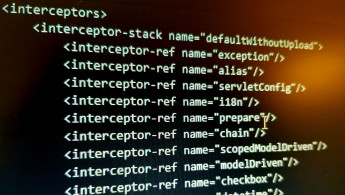Iran flags-up US star spangled banner cyber attack
Hundreds of thousands of router switches across the world have been affected by a cyber attack, that left the images if the US flag on computers.
2 min read
Iran was one of several countries hit by the virus [Getty]
A data centre in Iran is among thousands affected by a worldwide cyber attack that has left the US flag on computer screens and a message warning foreign powers against electoral interference.
Iran's IT ministry said that web access was cut off to thousands of subscribers in the country, which was made possible by Cisco router vulnerabilities.
"The attack apparently affected 200,000 router switches across the world in a widespread attack, including 3,500 switches in our country," Iran's communication and Information Technology (IT) ministry said in a statement.
Computers affected by the virus displayed the US flag with the message: "Don't mess with our elections."
Iran said it does not yet know who is responsible for the attack with the attack also affecting computers in Europe, China and the US.
"Some 55,000 devices were affected in the United States and 14,000 in China, and Iran's share of affected devices was 2 percent," Iran IT Minister Mohammad Javad Azari-Jahromi said, according to Reuters.
He did, however, highlight "weaknesses in providing information to (affected) companies" by the state computer emergency response body.
His ministry had also hinted that a foreign power was to blame for the attack.
"An image of the US flag that was used in hacking with a slogan about intervention in US elections, as well as the timing of the attack indicate that it has not originated in the Middle East," the communications ministry added.
Cyber attacks are a growing concern across the world with a number of major attacks affecting networks in the UK, US, Russia and other countries. Ofter these attacks are launched by criminal groups or amateur hackers.
There is growing concern that state-sponsored cyber attacks have been launched.
Iran has been subject to a number of cyber attacks, including one in 2012.
In 2010, an Iranian nuclear facility was targeted by the Stuxnet virus, which Tehran believed was an attempt to sabotage its uranium enrichment programme.
In recent years, Iran has blamed Saudi, US and UK hackers for other attacks.
Iran is also thought to run a large hacking network. It also has widespread online censorship and bans popular social media platforms.
Iran's IT ministry said that web access was cut off to thousands of subscribers in the country, which was made possible by Cisco router vulnerabilities.
"The attack apparently affected 200,000 router switches across the world in a widespread attack, including 3,500 switches in our country," Iran's communication and Information Technology (IT) ministry said in a statement.
Computers affected by the virus displayed the US flag with the message: "Don't mess with our elections."
Iran said it does not yet know who is responsible for the attack with the attack also affecting computers in Europe, China and the US.
|
|
"Some 55,000 devices were affected in the United States and 14,000 in China, and Iran's share of affected devices was 2 percent," Iran IT Minister Mohammad Javad Azari-Jahromi said, according to Reuters.
He did, however, highlight "weaknesses in providing information to (affected) companies" by the state computer emergency response body.
His ministry had also hinted that a foreign power was to blame for the attack.
"An image of the US flag that was used in hacking with a slogan about intervention in US elections, as well as the timing of the attack indicate that it has not originated in the Middle East," the communications ministry added.
Cyber attacks are a growing concern across the world with a number of major attacks affecting networks in the UK, US, Russia and other countries. Ofter these attacks are launched by criminal groups or amateur hackers.
There is growing concern that state-sponsored cyber attacks have been launched.
Iran has been subject to a number of cyber attacks, including one in 2012.
In 2010, an Iranian nuclear facility was targeted by the Stuxnet virus, which Tehran believed was an attempt to sabotage its uranium enrichment programme.
In recent years, Iran has blamed Saudi, US and UK hackers for other attacks.
Iran is also thought to run a large hacking network. It also has widespread online censorship and bans popular social media platforms.





 Follow the Middle East's top stories in English at The New Arab on Google News
Follow the Middle East's top stories in English at The New Arab on Google News


